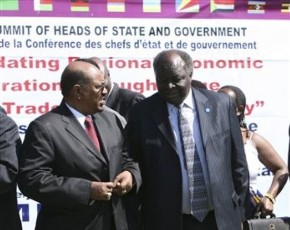Kenya seeks to contain row with Sudan over Bashir’s warrant
November 29, 2011 (KHARTOUM) – The Kenyan president Mwai Kibaki on Tuesday convened a high level meeting with senior members of his cabinet to discuss the ramifications of an order by a high court judge to arrest Sudanese president Omer Hassan al-Bashir should he visit Kenya.

The decision was in response to a petition submitted a year ago by the local chapter of the International Commission of Jurists (ICJ) seeking to compel the government to execute the arrest warrant against Bashir.
Nairobi received Bashir in August 2010 despite an arrest warrant issued for him by the International Criminal Court (ICC) on war crimes and genocide committed in Darfur. Kenya is a member of the Hague-based court and was theoretically obliged to apprehend the Sudanese leader but chose not to.
Sudan initially received Ombija’s ruling calmly and downplayed its significance stressing that it will not impact its relations with Kenya. But a few hours later it abruptly expelled the Kenyan ambassador and recalled its envoy in Nairobi as well. The foreign ministry in Khartoum today suggested that the presidency made the call.
The Nairobi-based ‘The Standard’ newspaper reported that Kibaki summoned a crisis meeting at his Harambee House office to discuss the matter with Internal Security minister George Saitoti, Head of Civil service Francis Muthaura, and Foreign Affairs Minister Permanent Secretary Thuita Mwangi, among others.
The sources told the newspaper that President Kibaki was of the view that the matter needed to be sorted out diplomatically and the cordial relationship between the two countries restored.
“But as you know the President [Kibaki] can do nothing because that was a court order delivered by reformed Judiciary and there is separation of powers between the three arms of government and the Executive cannot interfere,” the source at the office president said after the meeting.
The Kenyan foreign minister Moses Wetangula issued a statement on Tuesday in reaction to the court’s ruling and revealed that the government will appeal the decision. He also complained that the “ministry’s attempts to obtain a copy of the ruling have not been successful thus far”.
“[A]s much as we respect the ruling of the High Court, we are aware that the Court does not operate in a vacuum. It is important that the country’s national interests as well as the wider interests of the region that we live in are taken into account in matters of this nature. Since our judicial system provides for right of appeal, we shall carefully look at the judgment with a view to requesting the Attorney General to expeditiously prefer an appeal in the matter,” Wetangula said.
Wetangula also recounted legal arguments regarding immunities for heads of states under international norms and conventions emphasizing that it applies to Bashir despite the ICC warrant. Kenya’s top diplomat also recalled the African Union (AU) view on the Bashir indictment.
“You will recall that the Assembly of the African Union Heads of State and Government had in February, 2009 cautioned against the indictment of President Bashir and requested the UN Security Council to defer the process initiated by the ICC in accordance with the provisions of Article 16 of the Rome Statute. Kenya as a responsible and active member of the African Union fully subscribes to the position taken by the AU Assembly”.
Wetangula also described Sudan’s decision to expel its ambassador to Khartoum as “regrettable” but expressed understanding to the move.
“The Government of Kenya fully understands the anxiety created by the High Court ruling within the Republic of Sudan as it is a direct affront on the cardinal principle of sovereign immunity, as well as the collective African Union position on this matter”.
But Elise Keppler, senior international justice counsel at Human Rights Watch dismissed arguments by Wetangula.
“Kenya joined the ICC and as such, Kenya is obligated to cooperate with the ICC. As the ICC has issued an arrest warrant for al-Bashir, Kenya should arrest him if he enters its territory. With regard to the arguments on 98(1) and immunity, if Kenya has these concerns, it should raise them with the ICC as is provided by the ICC’s statute” Keppler said.
“Such concerns are no excuse for simply ignoring ICC requests for cooperation. We are talking about someone implicated in heinous crimes against victims in Darfur. Kenya should stand with victims and work to see al-Bashir and other alleged perpetrators held to account, not shield them from justice” she added.
The Kenyan Justice Minister Mutula Kilonzo said in press statements that the government has no choice but to obey the ruling and arrest Bashir in the event that he ventures into Kenyan territories.
The Sudanese foreign ministry spokesperson al-Obaid Marawih told reporters that the expulsion of Kenyan ambassador so quickly was a result of a delay by Nairobi of commenting on the court’s ruling.
He added that the expulsion does not mean severing ties between the two countries but that it’s a strong message of protest. Marawih said that he expects that the Sudanese ambassador will return to Nairobi within 24 hours noting that Kenya’s reaction shows that it does not wish to further escalate the situation.
The foreign ministry spokesperson also said that Sudan has received a request from Kenyan president that he sends a personal envoy to discuss the matter. A decision on that has been referred to “senior levels” he said.
(ST)
